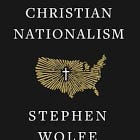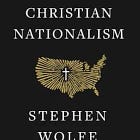The Case for Christian Nationalism
8. The Right to Revolution | III. Just Revolution (Part 2)
Previously:
Wolfe gives a definition of the varying types of resistance, but admits that the chapter is oriented towards violent overthrow of civil leaders.1 He then moves into a definition of what, in his mind, constitutes tyrannical rule.
A tyrant is any civil ruler whose actions significantly undermine the conditions in which man achieves his true humanity or, as I’ve called it, the complete good.2
As with other statements in this chapter, this definition is purely subjective. Could one conduct a survey, asking people what the “complete good” is, and get the same answer from any two people? Would one not get the exact same result when asking what would “undermine the conditions” of fulfilling “true humanity”? The vagueness and appeal to emotion of this statement serves Wolfe’s revolutionary ends. It also bears repeating that the “complete good” is his version of the traditional fascist concept of the nation’s full self-realization. Immediately following this, he describes the supposed behaviors of a tyrant, including that he is “mammish”. This is most likely a derivative of the word mammy, which he used previously, in chapter 7.3 Urban Dictionary has an alternate definition of “someone who is an extreme retard and is very young and has no friends at all,”4 but this does not make sense as his context, considering the preceding adjective of “smothering” fits the mammy stereotype. As before, I must conclude that he uses this word with full understanding of its racist connotations.
A tyrant in effect is one who, though having the appearance of civil authority, is but a man ordering fellow men to great evil. His injustice is worthy of a higher type of resistance, for it concerns the whole of civil life; it is not merely an injustice here or there.5
By these bounds, the United States is not under tyrannical rule. We are not yet being ordered to commit great evil, we are merely pressured to affirm evil. We are completely free to reject this proposition and form our own social and civil networks; conservative Christians are still allowed to be elected to public office and enact legislation that is at direct odds with things we believe are evil. Let us compare this to what being a Christian in an actual tyrannical government looks like.
In 1948, a Bulgarian Baptist minister, Haralan Popov, was denounced by the communists as a capitalist spy, along with most other protestant ministers in the country. He would spend the next thirteen years in prisons and gulags, while his wife and children suffered as social outcasts, until they were allowed to leave the country. In his book, Tortured for His Faith, Popov described the first night of his interrogation:
On 5th August, under the ‘death diet’ I was put into solitary confinement and subjected to a twenty-four-hour-a-day, non-stop interrogation. I had three interrogators, each one working an eight hour shift. This allowed them to keep up the physical and psychological torture twenty-four hours a day. This solitary confinement cell had one very unusual feature. The wall was shiny white, painted with a white high gloss enamel paint. I was ordered to stand facing the glaring white wall at a distance of eight inches and to keep my eyes open - wide open. My interrogator began to shout -
‘You must not move one inch!’
‘You must not close your eyes for one moment!’
‘You must not shift your weight!’
‘You must not move a muscle!’‘You must not… You must not…’ on and on he ranted as I stood at the wall. After only a few moments, my eyes burned as though hot irons were in them. At eight inches I was so close to the glaring white enameled wall that my eyes couldn’t focus. I suggest that my readers try this for only a moment. One’s eyes rebel. they fight to close or to focus and they can’t. It is terribly painful and yet when I merely blinked, my interrogator struck me across the side of my face.
The pain in my eyes became unbearable. ‘Tell me about your spy activities!’ shouted the interrogator.6
We are not living under benign rule; for example, the Biden administration has arrested pro-life protesters, such as activist Mark Houck, and attempted to railroad them for process crimes. But, the justice system is still functioning well enough that he was acquitted.7 He was not put on a starvation diet and tortured until he would denounce himself, like Popov was. We are nowhere near being under the type of tyrannical government where violent, religious revolution could perhaps be justified. Again, to hold such a position, as a Christian, is to telegraph one’s lack of intestinal fortitude and, ultimately, a lack of trust in God’s sovereignty and providence.
Wolfe then cites Aquinas and Althusius’s justification of the dissolution of tyrannical rule. He does not cite Scripture, because it does not explicitly condone such actions, and it must be noted that neither Aquinas nor Althusius forthrightly justifies violent rebellion in the provided quotes.8 The latter is also of great note, because the example of the “incurable cruelty” of a husband towards his wife is the very situation that Wolfe attacked Russel Moore over in chapter 5, for citing it as an undesirable effect of cultural Christianity (in that women felt a cultural pressure to not leave abusive husbands).
Three justifications for violence are then given; I will address them individually:
The nation is indeed a corporate individual, but a Christian individual is still primarily bound by the word of God. The New Testament could not be clearer that we are not to engage in proactive violence, even under tyrannical rule (2 Corinthians 10:3-6, 1 Peter 2:20-25, 1 Peter 3:13-20, 1 Peter 4:12-19, Matthew 26:52-54, Romans 12:19, Titus 3:1-7) and there are no New Testament verses to directly counter this interpretation.
There is no situation in which a majority of citizens peacefully gather to demand the removal of a civil leader where either 1) the leader realizes the hopelessness of his situation and peacefully abdicates his position, or 2) the leader uses military or police power to violently suppress the peaceful majority, making any proceeding violence from the majority reactive, instead of proactive. There is no Christian justification for consciously firing the first shot. Wolfe’s dilemma is that he is not in the majority.
“If a man aggresses against a nation, doing it harm, then the nation can respond as a nation to end the aggression” through peaceful, legal means. That would be how the nation would remove an individual tyrant. Wolfe again is attempting to paint his extreme minority as somehow embodying the will of a whole nation.
This attempt to justify violent revolution by Christians is paper-thin, unscriptural, and sophomoric. It should be outright rejected by Bible-believing Christians.
Next:
Stephen Wolfe, The Case for Christian Nationalism (Moscow, Idaho: Canon Press, 2022), 332.
Ibid., 333.
Ibid., 288.
Stephen Wolfe, 334.
Haralan Popov, Tortured for His Faith, 2nd ed. (London: Lakeland, 1971), 24.
Louis Casiano, “Pennsylvania Jury Acquits Pro-Life Activist Mark Houck on Charges of Obstructing Abortion Clinic Access,” Text.Article, Fox News (Fox News, January 30, 2023), https://www.foxnews.com/us/pennsylvania-jury-acquits-pro-life-activist-mark-houck-charges-obstructing-abortion-clinic-access.
Stephen Wolfe, 335-336.



